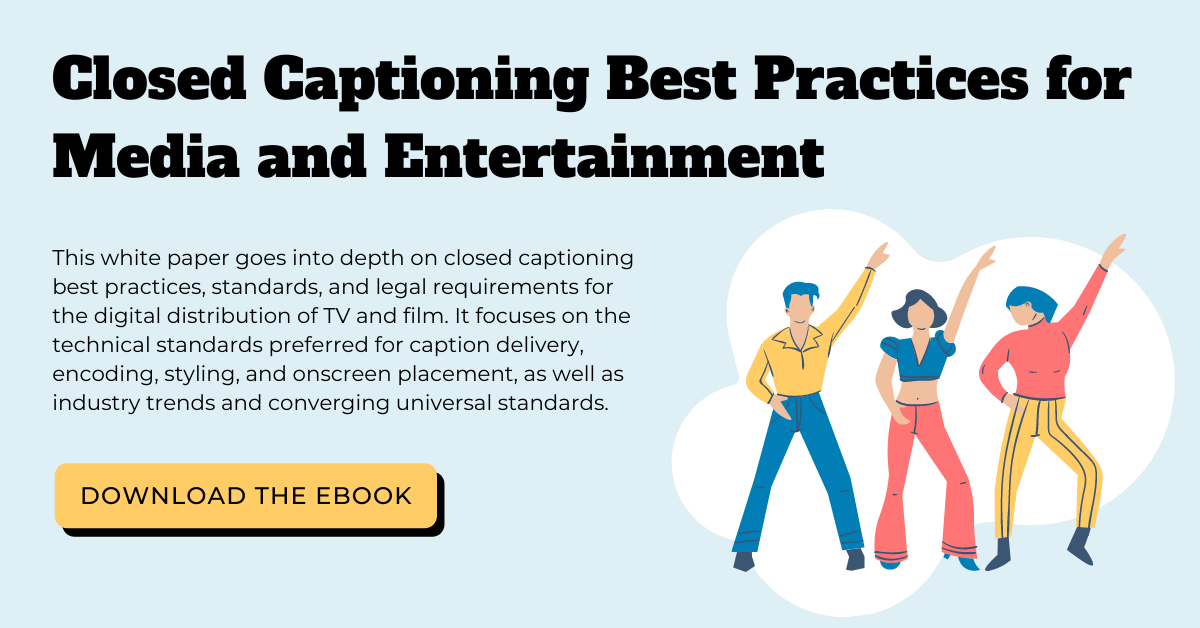Closed Captions Required for Movie Trailers
Updated: March 30, 2021
Movie trailers with captions help provide access for people with disabilities, particularly those who are deaf or hard of hearing. In addition to accessibility, movie trailers with captions are more likely to catch the viewer’s attention and keep them engaged.
Though the captioning benefits are abundant, legal regulations are another motivating factor to make movie trailers accessible.
The Federal Communications Commission (FCC) and the 21st Century Communications and Video Accessibility Act (CVAA) require captioning compliance for online video programming such as movie trailers.
Why Movie Trailers with Captions Are a Must
The Federal Communications Commission is the federal entity responsible for regulating communications by radio, television, wire, satellite, and cable across the United States.
The FCC provides its own captioning rules for internet video programming and also enforces the CVAA. This law ensures emerging technologies and communication channels are accessible to people with disabilities.
FCC Regulations for Captioning Online Movie Trailers
According to FCC regulations, if a movie trailer airs on television and is distributed via the internet, the provider must publish the movie trailer with captions.
The following are relevant FCC captioning regulations to note:
- As of March 30th, 2016, videos must be captioned within 15 days of being published online.
- Internet closed captioning rules only apply if the video programming was shown on TV in the U.S. with captions.
- Video Programming Distributors are responsible for passing through captions to videos.
Title II of the CVAA
The 21st Century Communications and Video Accessibility Act of 2010 is a federal communications law that is enforced by the Federal Communications Commission. The CVAA increases the accessibility of video programming. Specifically, it establishes closed captioning requirements for online video.
As of July 1, 2017, all pre-recorded full-length video programming, video clips, and montages of any length shown on television with captions must have captions when published online. This mandate would apply to movie trailers that have previously aired on TV.
The CVAA also requires online video that previously aired on television to have captions “of at least the same quality as when such programs are shown on television.” FCC caption quality standards are based on accuracy, timing, completeness, and placement.
Note: The CVAA does not require captioning for Internet-only video content. However, online video content could be covered under the Americans with Disabilities Act.
The Benefits of Movie Trailers with Captions
While it’s critical to comply with FCC captioning standards and regulations, the benefits of providing movie trailers with captions go beyond compliance.
Greater Accessibility and Reach
There are more than 48 million Americans with hearing loss, and providing movie trailers with captions is essential for ensuring access for people with disabilities. Not only do captions aid those who are deaf or hard of hearing, but it can make videos more accessible to English language learners and people with cognitive and learning disabilities.
Even with a broad audience, how can publishers improve the searchability and reach of their movie trailer? Captions help optimize online video for search engines and help to increase search traffic and viewership.
Better User Experience
First-party data reveals that 92% of consumers watch videos on mobile and 83% on desktops with the sound off. Due to this viewing behavior, video publishers are rightly concerned that viewers are muting their videos and missing the content. That’s where captions come in.
One in three individuals has captions on in public environments because it allows them to watch videos without any audio. Captions improve the movie trailer viewing by giving audiences the experience they crave – soundless and unobtrusive – leading to improved video performance.
Improved User Engagement
In a case study, Discovery Digital Networks added closed captions to their YouTube videos. Here’s what they found:
- Adding captions to YouTube videos increases views significantly.
- Views for captioned videos increased by 7.32% overall.
Captions create more engaging video content and, in turn, helps to boost video viewership and interaction.
Not only does providing movie trailers with captions help to ensure your online movie trailers are compliant with FCC regulations and laws, but it also provides a more accessible, engaging viewing experience for all viewers.
Further Reading

Subscribe to the Blog Digest
Sign up to receive our blog digest and other information on this topic. You can unsubscribe anytime.
By subscribing you agree to our privacy policy.










